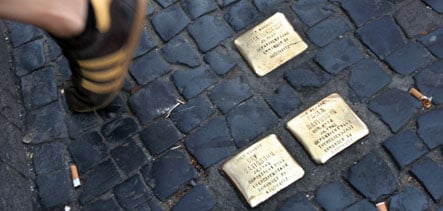Otto Peltzer was a German hero in the 1920s Weimar Republic, famous all over the globe and holder of world records over numerous middle distances including the 1,500 metres.
Some 30,000 people turned out in Berlin on September 11, 1926 to see him pull off a thrilling shock win over the Finnish running legend of the time Paavo Nurmi and Swedish long distance specialist Edvin Wide. But after 1933, “Otto the Strange”, as he was nicknamed, fell foul of the
Nazis after they took power in 1933 for two reasons: his outspokenness and his alleged homosexuality.
In 1935 he was sent to Ploetzensee prison for 18 months for breaking “moral laws” and was released just before the 1936 Olympics in Berlin – an event that Hitler hijacked and tried to turn into an advert for Ayran superiority. In 1938 after another prison term he went to Sweden where he remained in exile before returning to Germany in 1941. The Gestapo then sent him straight to Mauthausen concentration camp.
Peltzer survived, but life after the war was no bed of roses. Homosexuality was still a crime after 1945 and many of top officials in the German athletics establishment who had been willing collaborators with the Nazis kept their jobs – something which Peltzer was quick to criticize.
His enemies in the athletics establishment saw to it that the former hero was unable to find work as a trainer in other countries, writing to counties to badmouth him all over the world.
He wound up in India, where in 1959 he began a successful and happy eight years as trainer of some of India’s best athletes. He then returned to Germany with health problems where he died in 1970, aged 70.
Lilli Henoch meanwhile was also a sporting heroine in the 1920s, holding four world records not only in discus, shot put but also in the 4 x 100 metres relay. She won at national level in 10 different disciplines.
But Henoch’s “crime” was that she was Jewish. In 1933 she was forced to leave the Berliner Sportclub by the Nazis’ new race laws. She then joined a sports club only for Jews where she worked as a trainer before until the Kristallnacht in 1938. She then worked at a Jewish school which was then closed in 1942.
In September 1942 Henoch, her mother and her brother, also an athlete, were rounded up and taken to the Riga ghetto where all three disappeared without trace the same year.
According to the International Jewish Sports Hall of Fame, of which Henoch has been an inductee since 1990, she was shot and buried in a mass grave in the woods near the Latvian capital.
Peltzer now has a cross-country race in India and a German athletics award named after him, and in Berlin there is a Lilli-Henoch-Strasse, but last month they both also had so-called Stolpersteine installed in their honour in Berlin.
These Stolpersteine – literally “stumbling blocks” – are small plaques the size of a child’s hand fitted into the ground before the former homes of Holocaust victims. The shiny brass of the plaques catches the light and passers-by are drawn to stoop and read their small inscriptions. Each contains a short, stark biography of the key dates of the person’s life and death to the extent they are available from local records.
The project, initiated a few years ago by sculptor Gunter Demnig, is not without its critics but for many it is more effective than the huge and impersonal Holocaust memorial in central Berlin at bringing home the human side of what happened.
And on Friday, just as the 2008 Olympics gets under way in China with a three-hour spectacular, two much more low key events will officially inaugurate the Stolpersteine of Otto Peltzer and Lilli Henoch. And there are also many more like them whose fate is unclear, says Thomas Schnitzler, sports history professor at the German Sports University in
Cologne.
Before the Nazis took power in 1933, around 10 percent of the 1.3 million members of German sports clubs were Jewish “who were forced to leave overnight,” Schnitzler told AFP.
“What happened to them all is to a large extent unknown. We are only now starting to research” what happened, Schnitzler said.



 Please whitelist us to continue reading.
Please whitelist us to continue reading.